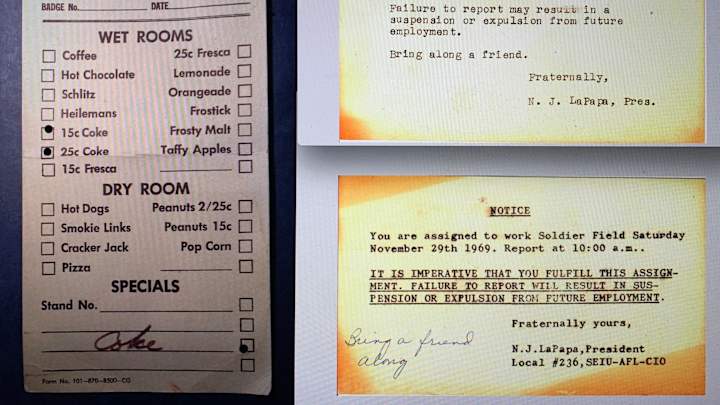Vending Was a Job that Brought Baseball into Focus. It Still Does for Some Veterans.

We all have these indelible moments where we remember exactly where we were when a major event happened.
A big one in my memory bank is coming up soon: On May 12, 1970, I was minding my business, hawking a tray of Cokes at Wrigley Field in the lower box seats.
If you extend a line from third base to home plate into the second row, I was standing there, making change. But I also was on my game. Ernie Banks was batting. And I always kept my eye on the ballgame at moments like that.
Ernie did not disappoint. With his powerful wrists, he launched a line drive into the left-field bleachers. It was his 500th home run. I can still see that ball, shooting off his bat and not stopping until it had cleared the spotty early-season ivy. And Ernie in the dugout, doffing his cap to an adoring crowd.
That was the beauty of vending. You could go to ballgames to your heart’s content—and your mom couldn’t call you a slackard.
I am not thrilled by the thought that I remember an event that happened 50 years ago as if it were yesterday. But I still have warm thoughts about spending three seasons as a vendor at Wrigley Field.
It was a great way to pay for college and see, if you knew when to look, baseball up-close. It was work, but it was fun—and it was a great learning experience.
There was a lot of drama in vending. I suppose that’s why so many vendors who started in the 1960s are still there. (More on that later.)
Vendors started their day by going in to see the men who dispensed the vending assignments. In my day, those men were named Luke and Cappy. Luke sat behind a desk, where he had stacks of vendors’ assignments cards arranged: Coke, peanuts, red hots, beer and so on, right on down to the dreaded lemonade/orangeade. I vaguely remember Fresca and Bugles, a salty Frito-like snack being sold for a while. But not sold often enough.
Cappy looked over Luke’s shoulder, advising and consenting. Established vendors were locked into many of the best items, such beer, hot dogs and ice cream. When you were new, Luke would ask you what you wanted. But if you asked for something above your station in life, forget about it. Shifting between Coke and peanuts was possible. Jumping up to hot dogs or ice cream required time and perseverance. When I finally climbed the ranks to hot dogs, it was a very proud moment.
Luke would hand you an assignment card (shown above), which you would turn in at the appropriate commissary: Left field, right field and their upper-deck counterparts.
The vendors’ union, SEIU Local 236, was a strange operation. It managed, protected and disciplined vendors.
My favorite summation were these postcards (displayed above) that we would receive from Nicholas J. LaPapa Sr., our president. Ordering us to work Northwestern football games at Dyche Stadium and various events at Soldier Field, a high school championship game or the Special Olympics.
To this day I am amused by the logic of being told, ``You’ll be suspended if you don’t show up. And bring along a friend.’’
I almost always found a way to wiggle out of those assignments.
Wrigley Field, where the Cubs and Bears played, was where it was at.
@@@
Here’s something that amazes me even more than the fact that a half-century has passed: 15 or 20 of the vendors I worked with are still vending at Wrigley Field. (Or will be, I hope, when the world is safe for baseball again.)
In what other occupations do people love their work so much that they hang around that long? Old rock-and-roll bands? The U.S. Senate?
And virtually all of the Half-Century Vendors do it because they like it doing it, my old friend Dave Klemp told me. Dave’s dad was our first Little League coach. We started vending at the same time, in 1969. By 1972, I had a summer job at the Wisconsin State Journal and was gone from the vending ranks.
But when I see all those familiar vending faces, I am happy for them, that they’re still doing something they enjoy so much.
Like me, Dave went off to college and graduated. He successfully held down a variety of more traditional jobs during his working career. Got married. Bought a house. But he kept vending. The stories of the other Half-Century Vendors are similar.
As Dave pointed out when we spoke recently, the senior citizens who were vending when we were kids were there because they needed the money. The seniors who are there now do it because they love to do it.
That’s a pretty strong statement about how interesting the vending life is.
@@@
If you like sports history with an extra bit of drama, please check out my 1908 Cubs novel, The Run Don’t Count. Excerpts and other information at facebook/therundontcount. It’s available in paperback and Kindle at Amazon.com.
